Afghan Army Not Doing So Well Against The Taliban
The Afghan Army isn't doing so well against the Taliban right now.
For some time now, the primary responsibility for fighting the Taliban has been in the hands of the Afghan Army rather than the American and British forces that remain in the country. This, of course, has been part of the process leading up to the eventual withdrawal of most of the coalition forces from the country. This Afghan Army has been trained and equipped by the United States and last year President Obama announced that as many as 10,000 American troops would remain in Afghanistan to continue that training mission as well as conduct counter-terrorism operations. As it turns out, though, the Afghan Army isn’t doing so well fighting the Taliban on its own:
KABUL, Afghanistan — After suffering setbacks and heavy casualties at the hands of the Taliban in 2014, Afghan security forces came into this year with what Afghan and Western officials acknowledge were relatively modest goals: hang on till the end of the fighting season without major collapses.
But with months of heavy fighting still ahead, 2015 is already shaping up to be worse for the Afghan Army and the national police, even as President Obama is set to begin deliberating this year on whether to follow through with a complete withdrawal of the United States military assistance mission here in 2016.
The forces are struggling to maintain a stalemate: an at-least token government presence in the hundreds of district capitals handed over by departing NATO combat troops.
Several Afghan officers described desertion as such a problem that soldiers and police officers in some critical areas have simply been barred from returning home on leave, keeping them on the front lines for months straight.
And after a casualty rate last year that the previous American commander called unsustainable, the numbers this year are even worse: up more than 50 percent compared with the first six months of 2014. About 4,100 Afghan soldiers and police officers have been killed, and about 7,800 wounded, according to statistics provided by an official with the American-led coalition here.
A range of interviews with army and police commanders and regional government officials in crucial battleground areas indicated that even though the Afghan forces have nominally met their goal of maintaining a presence in every city and all but a very few district centers, they are often functionally penned in by the Taliban, rarely mounting patrols, much less taking territory back.
At the same time, they say the insurgents have increased their influence in many areas, even near cities, giving them the ability to move freely and mount intensified attacks on the Afghan forces.
“We are in a passive defense mode — we are not chasing the enemy,” said a retired Afghan lieutenant general, Abdul Hadi Khalid. “Units get surrounded, and we don’t send them support, so they are killed.”
He described consequences of mounting casualties as “really grave,” undermining the confidence of the security forces and the Afghan public. “It will turn into a subversive war that benefits the enemy,” he added.
The fighting this year has put increased pressure on President Ashraf Ghani’s struggling government, even as he has succeeded in opening initial talks with the Taliban in the hope of beginning a formal peace process. For both sides in the war, battlefield results will govern how strong a hand they can bring to the negotiating table.
In several critical areas, particularly in the traditional Taliban heartland in the Afghan south and east, the army and the police say they are struggling to hold on.
In the district of Musa Qala, in Helmand Province, one army officer, Lieutenant Javed, said in a telephone interview from his outpost that he and his men had faced Taliban fire for seven months without being “out of the battle zone for a single day.”
In the past few months, some 41 of his comrades — more than a third of the soldiers in his area — have been killed, he said, as the Taliban mined the roads and attacked their guard stations in Musa Qala.
Home visits were banned after many soldiers began deserting, and in recent months in Musa Qala and a neighboring district there have been several cases of soldiers shooting themselves in the hope that they would be evacuated, said Lieutenant Javed, who spoke on the condition that he be identified only by his first name.
The urge to desert is often driven by more than just facing danger, he said. Many soldiers cannot access their pay, because it can be drawn only at a bank branch in the far-off provincial capital. “Your family is calling you and telling you they have run out of food, but you cannot send them money,” Lieutenant Javed said, describing the plight of soldiers who are often the sole breadwinners for large families. “This is depressing.”
(…)
Concerns about overall force attrition — which takes into account decisions not to re-enlist as well as casualties and desertions — rose sharply after the heavy losses last year, leading Afghan officials to mount a heavier recruiting effort. Though a few military and police recruiters interviewed at posts around Kabul said they ultimately came up short of their increased goals, most described continued success at bringing in new soldiers and police officers.
A spokesman for the Afghan Defense Ministry, Dawlat Waziri, insisted that desertions remained rare, and that there had been no effort to ban leaves or to stop rotations away from the front to cut down on the number of people going absent without leave.
But interviews with soldiers and police officers repeatedly countered the government’s claims. One army major in Oruzgan Province, for instance, speaking on the condition of anonymity to avoid retribution, said, “Once the soldiers are taken for their breaks, they are unwilling to come back and join their duty — and that’s the main reason the government is not taking them out.”
Constant themes in the security forces’ account were worsening morale, how close they were to the Taliban, and how far they were from help and reinforcements.
Based on these reports, the problems that the Afghan Army is having on the ground seem to be related more to morale and desertion problems than to the fact that they are being out fought by the Taliban, although that is undoubtedly a factor in some cases. By objective measures, in fact, the Afghan Army would seem to be clearly superior to the insurgent forces it is fighting both in terms of men and material. As we’ve seen in the past, however, superior numbers and better equipment don’t always lead to victory. It didn’t help the United States in Vietnam, the Soviets in their own adventure in Afghanistan, we saw it happen to the U.S. again in Iraq, and we’ve seen it happen again in Iraq as a superior Iraqi Army has turned and run in the face of ISIS on several occasions. In fact, the reports of what is happening now in Afghanistan sound remarkably similar to what has happened in Iraq, In both cases, an army that is objectively superior to the enemy that is fighting is failing on the field largely because of morale issues and the fact that its soldiers aren’t willing to fight. The issues impacting morale in Afghanistan, though, seem to be quite different from those at play among members of the Iraqi Army. In Iraq, a huge part of the problem is rooted in the Sunni-Shiite divide and the impact that it has had on domestic politics in Iraq. To put it bluntly, in many cases it appears as though Iraqi soldiers aren’t willing to fight because they aren’t necessarily committed to the idea of an united Iraq. In Afghanistan, the problems seem to be rooted mostly in the conditions that the troops are living in and the issue of solider pay, which is something that has bedeviled Generals for centuries. Several times during the Revolutionary and Civil Wars, for example, soldiers threatened to leave the field of battle, or did so, because their contracts were up or because they weren’t getting paid. Theoretically at least, this is an issue that could be resolved if the government and the military were willing to address the concerns of the soldiers. Until they do so, though, they’re likely to continue having problems in the field.
News like this, of course, inevitably leads to the question of whether or not we might end up seeing a renewal of more direct American involvement in the war. Given what we’ve seen unfold over the past year, it wouldn’t really be a surprise. Shortly after announcing the agreement to keep a residual force in country through the end of 2016, President Obama also began quietly slowing the ongoing withdrawal of forces above and beyond that residual force. In March of this year, President Obama and President Ghani formally agreed to continue the slower pace of that withdrawal at least through the end of this year. Then, in April, it was reported that American forces were involved in more than just training and counter-terrorism operations notwithstanding the previous claims of the Obama Administration. If the current trend continues in Afghanistan, it’s probable that there will be increased pressure on the White House to extend the U.S. mission, both in terms of its operational responsibilities and its length. Right now, all American forces are supposed to be out of Afghanistan by the end of 2016. Something tells me we shouldn’t count on that actually happening.
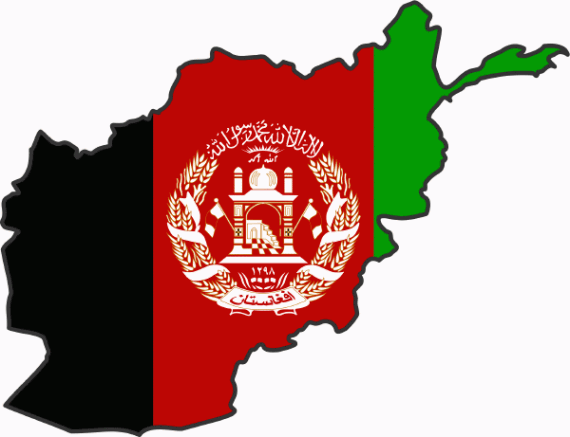

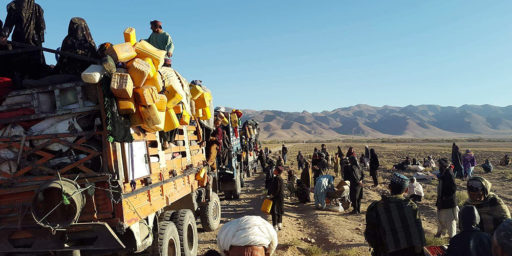
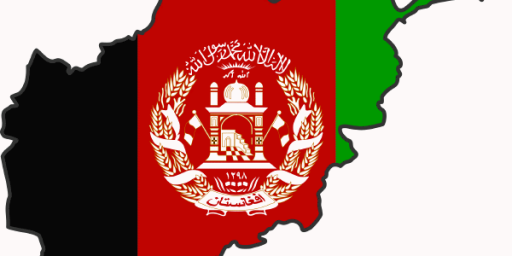
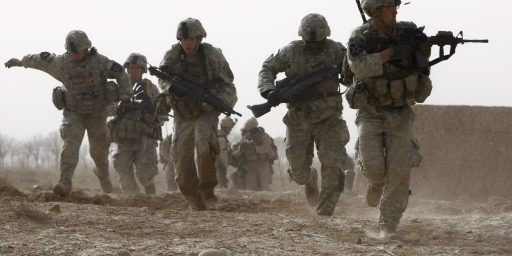
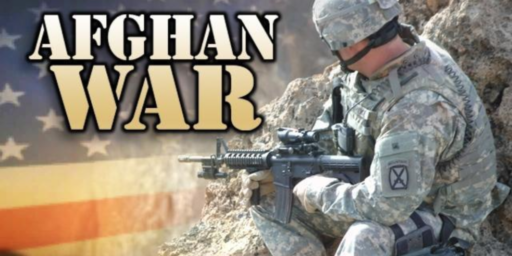
Another failed state based on colonial borders. If we’d given the NE to Takjikistan, the NW to Usbekistan and the E to Iran, the core left as straight Pashtun Afghanistan, most of the problems would have gone away.
@Mu:
Afghanistan has existed as a nation since before the Colonial Era. Yes, there are tribal divisions in the country but this isn’t a situation like the one in Iraq and Syria where you basically have nations that cobbled together in London and Paris at the end of World War One that didn’t exist before.
We need to admit something: we have no skill at training other people’s armies. We just don’t.
I don’t think the military understands that our way of making war isn’t just about technology or end-stage training, it’s an expression of our whole civilization. We assume a military that is not corrupt. We assume a military that is not directly political. We assume that loyalty flows primarily to the state rather than a tribe or region. We assume that western values of efficiency are universal. We assume our notions of syllogistic logic are universal.
The underlying assumptions are simply wrong. A thought experiment is to imagine a modern American being trained by Mongols. Do you suppose the American would ever adapt to the notion that he can be executed on the spot and without trial or recourse, not because he broke and ran, but because the guy next to him did? Do you think it would be an easy thing to get that American to murder hundreds of prisoners? Lie in wait outside a devastated town so he can rush back in and murder any women or children who survived your first onslaught?
People are not components, you can’t just plug them in.
Then, too, we are so all up in combined arms, a level of skill no Afghan army in the next hundred years will achieve. We come in with cultural assumptions that are wrong, with military advisers whose entire career has trained them to call up artillery or air strikes whenever they like, and try to cram this into the brains of barely-literate third world peasants who may not be entirely convinced that the earth is round, and certainly have no air force circling overhead.
We are probably the worst people on earth to train foreign fighters. We don’t win our wars by cleverness or courage or some unique fighting ability, we win our wars by crushing opposition beneath the sheer weight of our technology and money.
You want to train the Afghans to fight? It’s absurd. These people are some of the great warrior tribes of history, they know how to fight, they just don’t know how to fight like Americans. It’s not morale that’s the problem, it’s motive. People who see themselves as part of a tribe have to be led by their tribal chiefs, not by big, armor-clad GIs from another world.
More bribes, less “training.”
Afghanistan existed as an independent nation basically as “how far did the Pashtuns manage to extend their influence”, which indeed included a number of large empires, especially in the 18th century. But those were never united as a nation, and, as most states were at the time, subject to frequent readjustments. Only with the formal colonial regimes of the late 19th century were borders demarked and considered sacrosanct. In Afghanistan’s case that included a large Uzbek and Takjik minority and excluded about about a third of the Pashtuns which ended up in British India.
Unfortunately every example of trying to forge multi-national states not based on force seems to have gone majorly wrong, from Czechoslovakia to Yugoslavia to Nigeria to Iraq. So I don’t have much hope for Afghanistan in its current configuration, unless someone manages to use the Soviet method of massive ethnic rearrangement a la Germany, Poland and Ukraine after WWII.
As mentioned in the Original Post, ‘vietnamization’, fails essentially every time it’s tried. Unless, like Nixon’s effort at it, the goal is to escape with ‘honor’.
@michael reynolds: Great analysis, so I’m not sure that More bribes, less “training.” really applies, that place has been pretty much an ATM for US currency for the last 15 years. Maybe we need better trained “bribers” who make sure the bribee stays bought.
@Mu:
We pour money in at the top, to the national government that holds sway over several neighborhoods in Kabul and not much else. Most of what we give them is to buy weapons – from American contractors, of course.
I happened to be re-reading Flashman the other day, a wonderful book series. The storyline involved the British debacle in Afghanistan, which was started in large degree by a decision to cut the bribes to local chiefs. That slight united all the tribes and the Brits ended up crawling back to India, those that lived.
Gotta bribe the right people. Ten grand to a local chief who can give you twenty good men beats a billion dollars handed to some bureaucrat in Kabul. There are people in Afghanistan who hate the Pashtuns and would happily fight them if they were paid 50 bucks a month and handed a Lee-Enfield single shot from WW1.
I read all the Flashman! I did wonder if both the Soviet and the US chief of staffs did before they went.
@Mu:
I’m going to venture a guess that they did not.
The Flashman books are not only educational and gripping, but (short of Bill Bryson) I have never laughed as much over any other book.
@michael reynolds: I will just leave this here.
@michael reynolds: a single shot 303 Lee-Enfield would be worth far more then the bribe itself 😛
They are super rare and collectable.
@Mu:
This is largely bollocks.
Oddly the only part partly right, Pashtun territory, really should be “never have been split by the Empire into India (post facto, Pakistan).”
@Doug Mataconis:
Yes, although the late Empire division of Pashtun territory wasn’t absolutely long-term brilliant.
@michael reynolds:
While statements like “We assume our notions of syllogistic logic are universal. ” are rather… quaint in their old-school orientalist analysis (that is, vaguely bollocks), the more general point is indeed spot on.
Americans really are blind to how very, very differently structured loyalties and incentives are outside of their own culture and particular set of responses to the same. Leads you to go badly, badly wrong.
It is indeed a case of more bribes – facilitation and loyalty payments – less training – and as your subsequent comments suggest, via the local system of allegiences (and drop all the stupid USAID “remake Afghan society into USA society” programming) would be rather more effective.